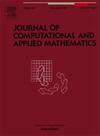The control parametrization technique for numerically solving fractal–fractional optimal control problems involving Caputo–Fabrizio derivatives
IF 2.1
2区 数学
Q1 MATHEMATICS, APPLIED
Journal of Computational and Applied Mathematics
Pub Date : 2025-06-10
DOI:10.1016/j.cam.2025.116814
引用次数: 0
Abstract
Fractal–fractional derivatives open new opportunities for modelling complex processes. In this paper, we develop a novel numerical computation approach for solving fractal–fractional optimal control problems with Caputo–Fabrizio derivatives. Firstly, we propose a general class of fractal–fractional optimal control problems with Caputo–Fabrizio derivatives and subject to state constraints of equality and inequality. Then, by using control parametrization technique, the fractal–fractional optimal control problem is approximated by a series of finite-dimensional optimization problems. Furthermore, the gradients of the cost and constraint functions in regard to decision variables are derived, which can be obtained by solving auxiliary fractal–fractional systems. A 3rd-order numerical scheme is also presented to solve the involved fractal–fractional systems. On the basis of this result, we develop a gradient-based optimization algorithm to solve the resulting optimization problem. Finally, numerical results of solving three examples, one of which involves optimal control of acquired immunodeficiency syndrome epidemic, are provided to demonstrate the applicability and effectiveness of the developed algorithm.
数值求解涉及Caputo-Fabrizio导数的分形-分数阶最优控制问题的控制参数化技术
分形-分数阶导数为复杂过程的建模提供了新的机会。本文提出了一种新的数值计算方法来求解具有Caputo-Fabrizio导数的分形-分数阶最优控制问题。首先,我们提出了一类具有Caputo-Fabrizio导数且受等式和不等式状态约束的分形-分数型最优控制问题。然后,利用控制参数化技术,将分形-分数形最优控制问题近似为一系列有限维优化问题。进一步推导了成本函数和约束函数在决策变量上的梯度,并通过求解辅助分形-分数系统得到。本文还提出了一种三阶数值格式来求解所涉及的分形-分数系统。在此结果的基础上,我们开发了一种基于梯度的优化算法来解决由此产生的优化问题。最后,给出了三个算例的数值结果,其中一个算例涉及获得性免疫缺陷综合征流行的最优控制,验证了该算法的适用性和有效性。
本文章由计算机程序翻译,如有差异,请以英文原文为准。
求助全文
约1分钟内获得全文
求助全文
来源期刊
CiteScore
5.40
自引率
4.20%
发文量
437
审稿时长
3.0 months
期刊介绍:
The Journal of Computational and Applied Mathematics publishes original papers of high scientific value in all areas of computational and applied mathematics. The main interest of the Journal is in papers that describe and analyze new computational techniques for solving scientific or engineering problems. Also the improved analysis, including the effectiveness and applicability, of existing methods and algorithms is of importance. The computational efficiency (e.g. the convergence, stability, accuracy, ...) should be proved and illustrated by nontrivial numerical examples. Papers describing only variants of existing methods, without adding significant new computational properties are not of interest.
The audience consists of: applied mathematicians, numerical analysts, computational scientists and engineers.

 求助内容:
求助内容: 应助结果提醒方式:
应助结果提醒方式:


